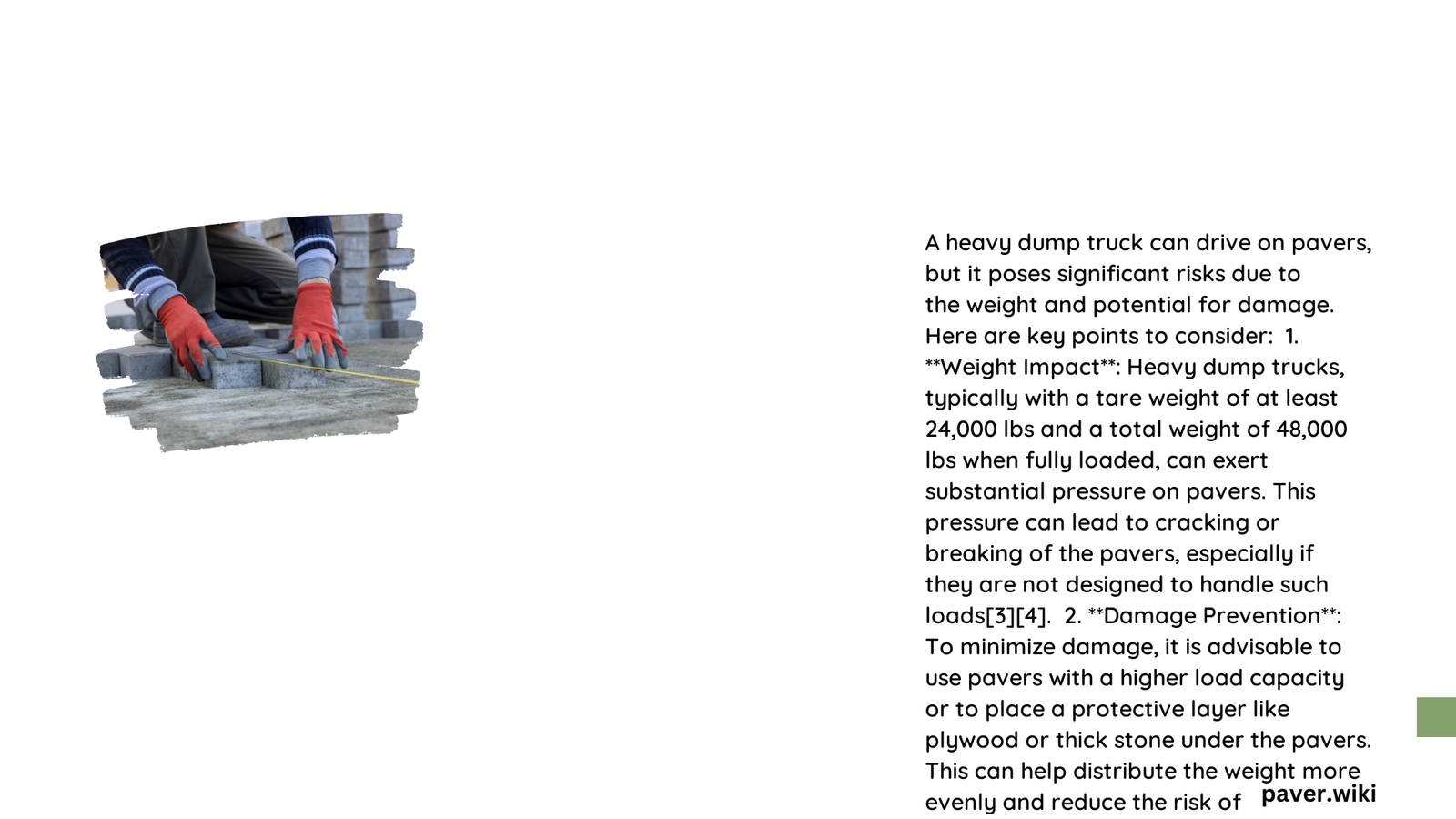Navigating the complex terrain of paver durability and heavy vehicle load requirements demands a nuanced understanding of engineering principles. Heavy dump trucks can potentially drive on pavers, but success depends on multiple critical factors including pavement structure, base layer strength, paver material composition, and precise installation techniques that distribute weight effectively and prevent structural damage.
What Determines Paver Load Capacity?
Can Pavers Withstand Dump Truck Weight?
Pavers’ ability to support heavy dump trucks isn’t a simple yes or no proposition. Multiple engineering considerations determine load-bearing capacity:
Structural Components
- Base Layer Composition
- Material Strength
- Installation Precision
- Compaction Techniques
| Paver Type | Load Capacity | Recommended Use |
|---|---|---|
| Concrete Pavers | High | Heavy Vehicle Traffic |
| Brick Pavers | Moderate | Light Traffic |
| Natural Stone Pavers | Very High | Premium Applications |
How Do Pavement Layers Impact Load Distribution?
Successful heavy vehicle support requires a multi-layered approach:
- Aggregate Base Layer
- Minimum 8-10 inches depth
- Compacted to 95% maximum dry density
-
Composed of crushed stone or gravel
-
Drainage Considerations
- Proper water management prevents base erosion
- Prevents structural weakening under heavy loads
What Factors Influence Paver Durability?
Critical elements determining paver performance include:
- Material Composition
- Concrete pavers offer superior strength
- Higher density materials resist cracking
-
Uniform material structure distributes weight
-
Installation Techniques
- Precise joint spacing (approximately 1/4 inch)
- Consistent compaction
- Use of polymer sand for joint stability
Can Tire Pressure Impact Paver Performance?
Tire pressure plays a significant role in load distribution:
- High Pressure Risks
- Increased contact pressure
- Potential surface damage
-
Accelerated wear patterns
-
Recommended Practices
- Maintain manufacturer-specified tire pressure
- Use wide-profile tires for better weight distribution
- Regular tire pressure monitoring
What Professional Recommendations Exist?
Experts suggest:
– Conduct professional load-bearing assessments
– Use reinforced paver systems for heavy traffic
– Implement regular maintenance inspections
– Consider alternative surfaces for consistently heavy traffic
Technical Considerations for Heavy Vehicle Pavers

Professional engineers recommend:
– Minimum 6-inch concrete paver thickness
– Geotextile reinforcement layers
– Professional engineering assessment before installation
Conclusion Insights
While heavy dump trucks can drive on properly designed and installed pavers, success depends on meticulous engineering, material selection, and ongoing maintenance.
Practical Recommendations
- Consult structural engineering professionals
- Select high-strength paver materials
- Invest in robust base layer construction
- Implement regular inspection protocols
Limitations and Cautions
- Not all paver systems are equal
- Regular maintenance is crucial
- Professional assessment recommended
Cost Considerations
Heavy-duty paver systems typically range:
– $15-$35 per square foot
– Higher initial investment
– Long-term durability benefits
Reference:
– FAA Pavement Construction Guidelines
– Roadtec Technical Papers
– ASTM Paving Standards
